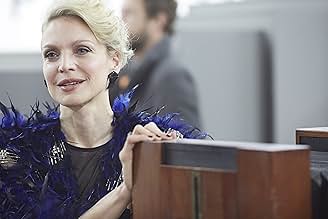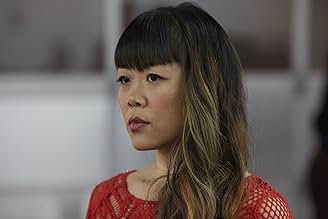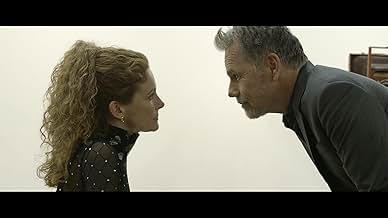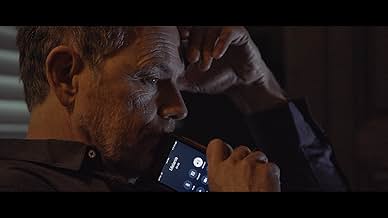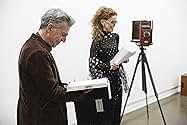Ajouter une intrigue dans votre langueMelanie experiences a terminal diagnosis, leading her to leave her husband and life behind for LA and an affair with a tintype photographer.Melanie experiences a terminal diagnosis, leading her to leave her husband and life behind for LA and an affair with a tintype photographer.Melanie experiences a terminal diagnosis, leading her to leave her husband and life behind for LA and an affair with a tintype photographer.
- Réalisation
- Scénario
- Casting principal
- Récompenses
- 1 nomination au total
Avis à la une
This film is beautiful and gripping. The cinematography is gorgeous. The story line keeps you on the edge of your seat weaving the relationships and unveiling hidden secrets. Leslie Hope is an amazing actor and a joy to watch. Amazing!!
Highly recommend watching this film. It analyzes relationships in a refreshing and thoughtful way and offers different perspectives of situations you don't often see films covering. Great to see so many wonderful Canadian faces too!
Greetings again from the darkness. The fine line of demarcation between "art" and pornography is one of society's longest-running debates. "I know it when I see it" was made official in 1964 by Supreme Court Justice Potter Stewart in a case where the subjective categorization of obscenity was on trial. Of course the obvious problem with that definition is that everyone "sees it" differently. Director Jerry Ciccoritti ("Schitt's Creek") presents a film version of Jeff Kober's stage play "Pornography". Mr. Kober, a veteran actor, also appears here as a key character.
Leslie Hope stars as Melanie, our lead character and narrator. Melanie is diagnosed with a terminal illness, and her reaction to that affects her marriage, her sobriety, her friends, and results in a controversial art exhibit. That art exhibit acts as a framing device and structure for a film that is mostly various vignettes assembled together in a somewhat related, yet haphazard manner. We initially witness Melanie's anxiety over opening night, and the reason for her trepidation is slowly revealed ... the exhibit is set up as a peep show of the tintype photographs taken of her vagina. Yep, the worst possible news from the doctor led her to expose her lady parts, while also falling into the stereotypical lustful affair with the photographer (played by writer Kober).
We watch as each of her invited friends take a glimpse at the photographs. It's not until the closing credits that we see Melanie the way they see Melanie, but the ensuing conversations tell us what we need to know. Each of the attending couples and friends gets their own dedicated segment preceded by their own tintype photograph. These cool retro photographs were the highlight to this viewer. However the focus of the film is how each person reacts to the exhibit and how it impacts their own relationship, most of which seem teetering on the brink of collapse. After each vignette, we are returned to the exhibit's opening night, and also get additional color on Melanie's search for meaning in life.
The characters we briefly get to know include Melanie's husband Frank (Bruce Greenwood), who seems impossibly patient and understanding, given the situation. A substantial portion of their conversations occur over the phone while Frank sits alone in their bedroom (or even asleep). Others we meet: Mickey (Kristin Lehman), an alcoholic middle-aged party girl, Jerry (Daniel Maslany, brother of Tatiana), the acting DJ and AA member under sponsor Frank, Diane (Megan Follows), Tom (Kris Holden-Reid), Brian (David Hewlett), and married couple Betsy (Grace Lynn Kung) and Gregg (Benjamin Ayres), who air entirely too many grievances for our comfort.
Alcoholism and AA are referenced throughout the film, and Mickey even spouts, "Alcoholism is a good idea taken too far." A misplaced debate on the best rock and roll drummer falls flat, but at least offers a momentary reprieve from the non-stop chatter on sex and vaginas. Obviously the title has dual meanings, and what the film does best is reinforce the need for art to spark conversation, debate and reflection.
Leslie Hope stars as Melanie, our lead character and narrator. Melanie is diagnosed with a terminal illness, and her reaction to that affects her marriage, her sobriety, her friends, and results in a controversial art exhibit. That art exhibit acts as a framing device and structure for a film that is mostly various vignettes assembled together in a somewhat related, yet haphazard manner. We initially witness Melanie's anxiety over opening night, and the reason for her trepidation is slowly revealed ... the exhibit is set up as a peep show of the tintype photographs taken of her vagina. Yep, the worst possible news from the doctor led her to expose her lady parts, while also falling into the stereotypical lustful affair with the photographer (played by writer Kober).
We watch as each of her invited friends take a glimpse at the photographs. It's not until the closing credits that we see Melanie the way they see Melanie, but the ensuing conversations tell us what we need to know. Each of the attending couples and friends gets their own dedicated segment preceded by their own tintype photograph. These cool retro photographs were the highlight to this viewer. However the focus of the film is how each person reacts to the exhibit and how it impacts their own relationship, most of which seem teetering on the brink of collapse. After each vignette, we are returned to the exhibit's opening night, and also get additional color on Melanie's search for meaning in life.
The characters we briefly get to know include Melanie's husband Frank (Bruce Greenwood), who seems impossibly patient and understanding, given the situation. A substantial portion of their conversations occur over the phone while Frank sits alone in their bedroom (or even asleep). Others we meet: Mickey (Kristin Lehman), an alcoholic middle-aged party girl, Jerry (Daniel Maslany, brother of Tatiana), the acting DJ and AA member under sponsor Frank, Diane (Megan Follows), Tom (Kris Holden-Reid), Brian (David Hewlett), and married couple Betsy (Grace Lynn Kung) and Gregg (Benjamin Ayres), who air entirely too many grievances for our comfort.
Alcoholism and AA are referenced throughout the film, and Mickey even spouts, "Alcoholism is a good idea taken too far." A misplaced debate on the best rock and roll drummer falls flat, but at least offers a momentary reprieve from the non-stop chatter on sex and vaginas. Obviously the title has dual meanings, and what the film does best is reinforce the need for art to spark conversation, debate and reflection.
Echoing what cleovaillancourt said below - I thought this was beautifully done. Loved the elements of Toronto, and found Leslie Hope and Bruce Greenwood to be a wonderful pair. This film was raw, artistic, emotional, a bit edgy, and all around one I would recommend watching.
Also, the photos shown throughout the film are such an interesting style!
Also, the photos shown throughout the film are such an interesting style!
This film takes a story I've seen before and turns it on it's head. I love how Lie Exposed takes themes often considered taboo and brings them into the open for all of the characters to grapple with. The film itself looks beautiful and at times feels like a love letter to the city of Toronto. Highly recommend!
Le saviez-vous
- ConnexionsFeatured in 2020 Canadian Screen Awards for Cinematic Arts (2020)
Meilleurs choix
Connectez-vous pour évaluer et suivre la liste de favoris afin de recevoir des recommandations personnalisées
- How long is Lie Exposed?Alimenté par Alexa
Détails
Box-office
- Montant brut aux États-Unis et au Canada
- 5 938 $US
- Week-end de sortie aux États-Unis et au Canada
- 2 957 $US
- 27 sept. 2020
- Montant brut mondial
- 5 938 $US
- Durée1 heure 33 minutes
- Couleur
Contribuer à cette page
Suggérer une modification ou ajouter du contenu manquant

Lacune principale
By what name was Lie Exposed (2019) officially released in India in English?
Répondre

![Trailer [EN]](https://m.media-amazon.com/images/M/MV5BMDRlNTEzZDItODFmNy00NDc3LWFlMDQtZGU2MDc3Njk1YzIwXkEyXkFqcGdeQXRyYW5zY29kZS13b3JrZmxvdw@@._V1_QL75_UX500_CR0)


